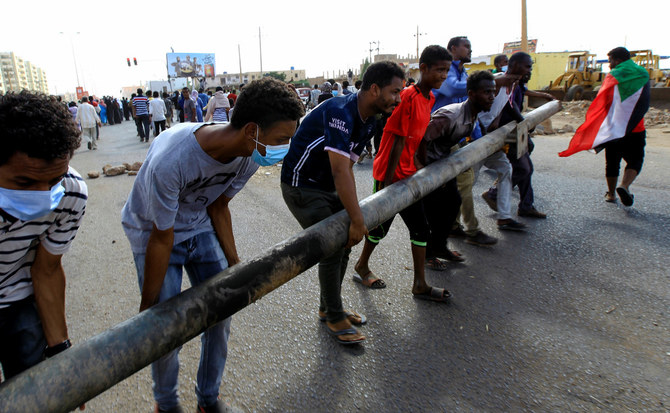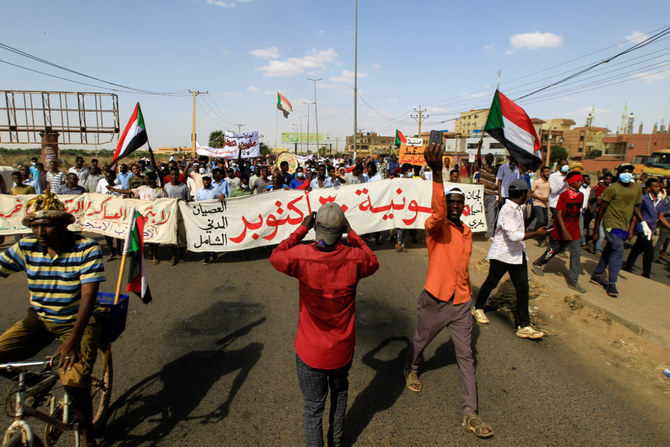CAIRO: Tens of thousands of Sudanese took to the streets across the country Saturday, in the largest pro-democracy protest yet since the military seized control earlier this week.
Three protesters were killed and dozens injured — several by live rounds — as security forces opened fire in several locations, a doctors’ union said.
The coup, condemned by the international community, has threatened to derail Sudan’s fitful transition to democracy, which began after the 2019 ouster of long-time autocrat Omar Al-Bashir. Since then, the military and civilian leaders have governed in an uneasy partnership.
Pro-democracy groups had called for protests across the country Saturday to demand the re-instating of a deposed transitional government and the release of senior political figures from detention.
The United States and the United Nations had warned Sudan’s strongman, Gen. Abdel-Fattah Burhan, that they view the military’s treatment of the protesters as a test, and called for restraint.
Burhan has claimed that the transition to democracy would continue despite the military takeover, saying he would install a new technocrat government soon. But the pro-democracy movement in Sudan fears the military has no intention of easing its grip, and will appoint politicians it can control.
Saturday’s large turnout is bound to increase pressure on the generals who face condemnations from the US and other Western countries to restore a civilian-led government.
Crowds began to gather Saturday afternoon in the capital of Khartoum and its twin city Omdurman. Marchers chanted “Give it up, Burhan,” and “revolution, revolution.” Some held up banners reading, “Going backward is impossible.”
The demonstrations were called by the Sudanese Professionals’ Association and the so-called Resistance Committees. Both were at the forefront of an uprising that toppled longtime autocrat Omar Al-Bashir and his Islamist government in 2019. They are also calling for the dismantling of paramilitary groups and restructuring of the military, intelligence and security agencies.
All three protesters killed Saturday were shot in Omdurman. One was shot in his head, another in his stomach, and a third in his chest, the Sudan Doctors Committee and protesters said.
The committee, which is part of the Sudanese Professionals’ Association, said security forces had used live ammunition against protesters in Omdurman and nearby. It said it counted more than 110 people wounded, some with gunshots, in Khartoum, Omdurman and the eastern province of Al-Qadarif.
Sudanese police denied using live ammunition and said in a statement that a policeman was wounded by gunfire. They said they used tear gas to disperse groups of demonstrators who allegedly attacked their forces and “important positions.” The statement did not elaborate.
Elsewhere, security forces fired tear gas at protesters as they attempted to cross the Manshia Bridge over the Nile River to reach Khartoum’s downtown, said Mohammed Yousef Al-Mustafa, a spokesman for the professionals’ association.
“No power-sharing mediation with the military council again,” he said, marching at an area protest.
Anti-coup protests also erupted in other areas, including the Red Sea city of Port Sudan, Kassala in eastern Sudan, and Obeid, in North Kordofan province, according to activists.
As night fell, plain clothes security forces chased off protesters in Khartoum and Omdurman, to prevent them from setting up sit-ins, activists said. In some neighborhoods, protesters blocked roads with makeshift barricades.
Earlier on Saturday, security forces blocked major roads and bridges linking Khartoum’s neighborhoods. Security was tight downtown and outside the military’s headquarters, the site of a major sit-in during the 2019 uprising.
Since the military takeover, street protests have been daily. With Saturday’s fatal shootings, the overall number of people killed by security forces since the coup rose to 12, according to the Sudan Doctors’ Committee and activists. More than 280 others were wounded. Troops have fired live ammunition, rubber bullets and tear gas at anti-coup demonstrators, and beat protesters with sticks in recent days.
Meanwhile, talks are ongoing to try to mitigate the crisis.
Late Friday, the UN special envoy for Sudan, Volker Perthes, met with Gen. Mohammed Hamdan Dagalo, a coup leader seen as close to Burhan. Dagalo commands the feared Rapid Support Forces, a paramilitary unit that controls the streets of Khartoum and played a major role in the coup.
He said the UN’s transition mission for Sudan is facilitating dialogue between the top generals and civilian leaders. Perthes said this “remains the only path toward a peaceful solution to the current crisis.”
A Sudanese military official said Saturday that a UN-supported national committee began separate meetings with Prime Minister Abdalla Hamdok and Burhan to find common ground.
The official said Hamdok demanded the release of all government officials and political figures arrested since the coup. Burhan, the official said, gave an initial approval to release “most” of the detained, but rejected the release of others, including Khalid Omar, the minister of Cabinet Affairs, saying they face accusations of inciting troops to rebellion.
The official spoke on condition of anonymity as he wasn’t authorized to release the information.
Meanwhile, the UN said it is closely monitoring security forces’ response on Saturday.
“They will be held individually accountable for any excessive use of force against protesters,” said Clément Nyaletsossi Voule, the UN special rapporteur on the right to freedom of peaceful assembly and association.
Burhan has claimed that the takeover was necessary to prevent a civil war, citing what he said were growing divisions among political groups. However, the takeover came less than a month before he was to have handed some power to a civilian.
Burhan installed himself as head of a military council that he said will rule Sudan until elections in July 2023. Observers say it’s doubtful the military will allow a full transition to civilian rule, if only to block civilian oversight of the military’s large financial holdings.
Tens of thousands protest Sudan’s coup, 3 protesters killed
https://arab.news/bz37f
Tens of thousands protest Sudan’s coup, 3 protesters killed

- Resistance Committees accuse security forces of using live bullets against protesters
- UN-supported national committee hold separate meetings with PM Hamdok and coup leader to find common ground
Death toll in Iran protests over 3,000, rights group says

- The protests erupted on December 28 over economic hardship and swelled into widespread demonstrations calling for the end of clerical rule
- President Donald Trump, who had threatened ‘very strong action’ if Iran executed protesters, said Tehran’s leaders had called off mass hangings
DUBAI: More than 3,000 people have died in Iran’s nationwide protests, rights activists said on Saturday, while a “very slight rise” in Internet activity was reported in the country after an eight-day blackout.
The US-based HRANA group said it had verified 3,090 deaths, including 2,885 protesters, after residents said the crackdown appeared to have broadly quelled protests for now and state media reported more arrests.
The capital Tehran has been comparatively quiet for four days, said several residents reached by Reuters. Drones were flying over the city, but there were no signs of major protests on Thursday or Friday, said the residents, who asked not to be identified for their safety.
A resident of a northern city on the Caspian Sea said the streets there also appeared calm.
The protests erupted on December 28 over economic hardship and swelled into widespread demonstrations calling for the end of clerical rule in the Islamic Republic, culminating in mass violence late last week. According to opposition groups and an Iranian official, more than 2,000 people were killed in the worst domestic unrest since Iran’s 1979 Islamic Revolution.
“Metrics show a very slight rise in Internet connectivity in #Iran this morning” after 200 hours of shutdown, the Internet monitoring group NetBlocks posted on X. Connectivity remained around 2 percent of ordinary levels, it said.
A few Iranians overseas said on social media that they had been able to message users living inside Iran early on Saturday.
US President Donald Trump, who had threatened “very strong action” if Iran executed protesters, said Tehran’s leaders had called off mass hangings.
“I greatly respect the fact that all scheduled hangings, which were to take place yesterday (Over 800 of them), have been canceled by the leadership of Iran. Thank you!” he posted on social media.
Iran had not announced plans for such executions or said it had canceled them.
Indian students and pilgrims returning from Iran said they were largely confined to their accommodations while in the country, unable to communicate with their families back home.
“We only heard stories of violent protests, and one man jumped in front of our car holding a burning baton, shouting something in the local language, with anger visible in his eyes,” said Z Syeda, a third-year medical student at a university in Tehran.
India’s External Affairs Ministry said on Friday that commercial flights were available and that New Delhi would take steps to secure the safety and welfare of Indian nationals.














